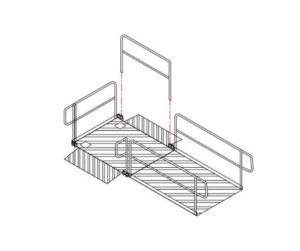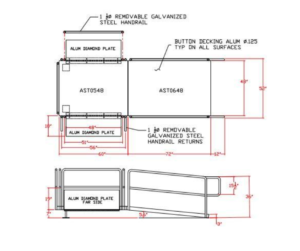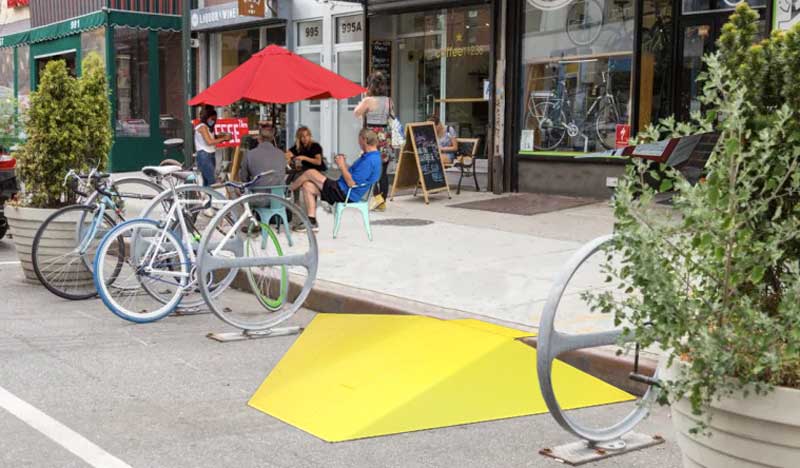Accessibility, Safety
Outdoor Accessibility at Restaurants in a Covid-19 World
Of all the things that people miss during the season of COVID-19, dining at a favorite restaurant is likely to be at the top. Who doesn’t miss a great burger, a perfectly cooked omelet, or a great craft cocktail? In this brave new world, restaurant dining has effectively become outdoor dining, and leave it to American entrepreneurship and ingenuity to find a way to meet the needs of a public that wants to enjoy as much normal as is possible.
For example, right here in our own Chicago backyard, we’ve seen large, wedding-style tents erected in restaurant parking lots, creating an al fresco dining experience that’s not only enjoyable but also widely spaced and safe. Streets and sidewalks have been closed to vehicular traffic creating a European city vibe that many find inviting.
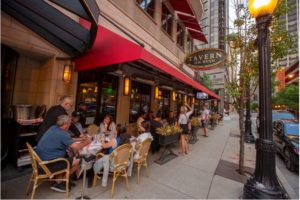
With sidewalks rapidly turning into outdoor dining spaces, many restaurant owners and local authorities are creating safe, accessible dining areas on sidewalks and on side streets. As a result, street curbs have become a new challenge for restaurateurs. Indeed, restaurant owners, in addition to feeding and entertaining guests, are fast becoming ADA experts, creating accessible outdoor spaces for patrons in wheelchairs, using a cane, pushing strollers (and more).
The National Restaurant Association holds restaurants accountable regarding ADA compliance, while also protecting their members from erroneous claims from abusive lawsuits.
“Restaurants strive to provide a welcoming environment and want to ensure unfettered access and accommodation for every guest to provide an exceptional dining experience. As such, we uphold the Americans with Disabilities Act as a vital law that has improved access and equality for Americans with disabilities.
The law’s integrity, however, is being compromised by an onslaught of abusive lawsuits filed by a cottage industry of attorneys and vexatious litigants who target restaurants and other small businesses to extort costly legal settlements. The ADA was intended to improve access, not line the pockets of unscrupulous attorneys seeking a payout.”
The Village of Libertyville in Illinois is well known in the Chicagoland area for having a plethora of curbside dining on Milwaukee Ave. According to their Public Works Department, these municipal sidewalks are the responsibility of the village to safely maintain, while providing ADA Accessibility at each intersection of the street. As for private property maintained by the restaurants (i.e. parking lots, curbside landings, decks, etc.) is the responsibility of the restaurant owner. Any ramps in use must adhere to IDOT (Illinois Department of Transportation) specifications and cannot obstruct traffic flow or curbside parking in any way. Ramps, even on private property, must also be approved by local ordinances and follow ADA compliances. This will vary greatly depending on local ordinances. When installing a ramp, even temporary, always be sure to obtain approval from your local authorities.
With Restaurants’ financial resources already incredibly limited in these difficult times, the solution needs to be both fast and cost-effective. An excellent, right-from-the-box sidewalk access and safety solution is the Built-Up Curb Ramp designed and manufactured by Handi-Ramp. The Built-Up Curb Ramp was designed to provide instant sidewalk accessibility for wheelchairs, scooters, strollers, carts, bicycles, and anything else on wheels.
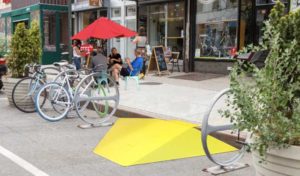
Handi-Ramp’s Built-Up Curb Ramp is an alternative to having to create a curb cut ramp, which takes time to build, is expensive, and also potentially inconvenient. The Handi-Ramp built-up ramp can be installed in less than 30 minutes at any curb. The ramp instantly creates curb access and enables restaurants and municipalities to meet ADA access requirements at a cost substantially than that of concrete reconstruction (curb cuts).
The Handi-Ramp Built-Up Curb Ramp features our exclusive non-slip raised button surface which provides unparalleled traction in all weather conditions. The side wings allow safe access on-to and off-of a curb. Standard sizes available include 3 and 6-foot length ramps. Custom sizes can be manufactured. Contact one of our ramp experts at (800) 876-7267 to discuss your outdoor dining areas’ specific needs.
The design of the curb cut ramp complies with Section 4.7.6 of the Americans with Disabilities Act (ADA) and will enable building owners and municipalities to create access for people in wheelchairs without having to schedule a construction crew or hire contractors to pour new concrete.
This Built-Up-Curb Ramp is portable by design so it can be set in place at a location for temporary or permanent use. Today, many cities have scheduled curb cut permanent installations and some city managers have used the built-up curb ramps to create temporary access in these locations for their specific needs. The Built-Up Curb Ramp can be secured quickly and easily by simply using concrete anchor bolts. Custom variations can be designed with or without handrails.
Please call us at (800) 876-RAMP if you are looking for a custom size, or need help with measuring or design ideas. Our expert staff is happy to provide any assistance.
FEATURES:
- Ramp is portable
- Installation is quick and easy
- Constructed of reinforced steel and stainless steel hinges
- The unique exclusive non-slip raised button surface
- Meets ADA access requirements
- Custom sizing is available
- Made in the USA
- Zink coated then painted yellow
- Rust free
- An additional shipping charge will be added for orders outside of the contiguous United States
